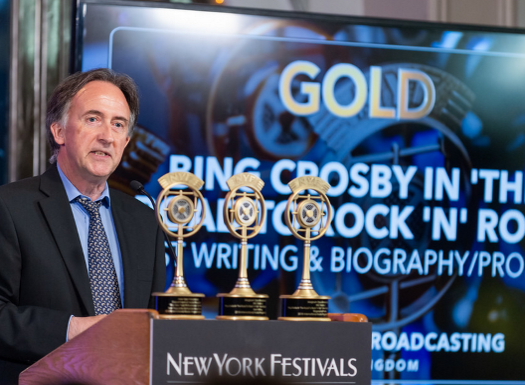The 2018 New York Festivals Radio Awards celebrated the World’s Best Radio Programs on June 19 in New York City. Prominent award-winning, producers, directors, presenters and content creators from around the globe took to the stage to accept their trophies and celebrate their success. NYF’s Radio Awards shines the spotlight on exceptional radio content in all lengths and formats and across all platforms from radio stations, networks and independent producers.
Lewis Borg-Cardona is multi-awarding winning freelance radio and audio producer/writer for LB-C Productions, UK. His production “Bing Crosby In ‘The Road To Rock ‘n’ Roll’ – From Final Solution To Audio Revolution” was announced as a double Gold Award winner in the 2018 New York Festivals International Radio Program Awards. The show triumphed in the documentary category ‘Biography/Profiles’ and achieved Gold for ‘Best Writing’.
New York Festivals: What sparked the idea for “Bing Crosby In ‘The Road To Rock ‘n’ Roll’ – From Final Solution To Audio Revolution”?
Lewis Borg-Cardona: My co-producer Steve Levine touched on the intriguing genesis of magnetic tape recording in passing, as part of a totally separate BBC Radio 2 series, the 2009 Stephen Fry hosted Third Reich ‘n’ Roll. When the 40th anniversary of Bing Crosby’s 1977 passing came up last year, it coincided with the 70th anniversary of the very first radio programme recorded on magnetic tape – Bing Crosby’s Philco Radio Time – so the confluence of commemorations seemed too good to pass up; in terms of a more in-depth look at Crosby and his influence on radio technology.
New York Festivals: What creative challenges did you encounter when producing and how did you solve those challenges?
Lewis Borg-Cardona: The one hour documentary celebrated two different anniversaries, so the content split into two distinct time frames: a period of years in the 1940s, versus the last month of Bing Crosby’s life, in 1977. While both periods were integral to the telling of the story, their historical context meant it was inevitable the show would include a good deal of vintage material and archive interviews. However, I wanted to ensure the show also contained enough original material to add something fresh to the story, so it was essential to source at least a couple of ‘eye witnesses’ to the second part of the time frame. Also, with a good deal of technical detail and storytelling to get across, I was very aware that my script was on the ‘wordy’ side, so I needed to find a device to relieve the pressure on our narrator.
Steve Levine’s great record industry contact book meant that we reached out to L.A. based Steve Taylor – the man who had engineered Crosby’s very last commercial recording Seasons, in London in 1977.
In addition, some simple research on my part unearthed the existence of 91 year old young Gordon Rose, now enjoying retirement in the English countryside; but the man who back in 1977 was Crosby’s very last Music Director for his UK tour, London Palladium residence, and final radio session at the BBC’s famous Maida Vale studios. With both on board, their combined recollections did much to flesh out the 1977 part of the story. As for the ‘wordy’ script, I initiated a simple device of utilizing an extra VO to voice several extracts taken from entertainment industry magazines (Variety, Hollywood Reporter, etc), of the 1940s, thus breaking up the narration.
New York Festivals: To what do you attribute the success of this program?
Lewis Borg-Cardona: In essence, the programme’s success was due to the quality of the storylines: the little known saga of the Nazi Magnetophon tape machines and Bing Crosby’s involvement in their U.S. radio utilization and subsequent development was a story worth telling, while the better known tale of the crooner’s last days in England was due a detailed retelling. Furnished with the facts, my script was then lifted from the page by a quality narration. Our documentary was lucky to have my first choice as narrator – the excellent actress and singer Elizabeth McGovern. And to give Elizabeth every chance to do her best, we made the executive decision to allow her enough studio time not only to read the script, but to hear all the audio items before and after her script inserts, so she could narrate in context. I can’t over emphasise how important that is, in terms of giving a narrator every opportunity to shine.
New York Festivals: What was your ultimate goal for the program?
Lewis Borg-Cardona: The goal for me as a documentary maker is always to do the story justice and to adhere to the classic Reithian values: to inform, educate and entertain. Above and beyond that, it’s always nice to get some good press (the show was ‘Pick Of The Day’ in no less than half a dozen UK national newspapers), not to mention some awards (thanks New York Festivals!). However, in the case of this show the ultimate accolade came courtesy of BING magazine (yes indeed, the magazine of ‘The International Club Crosby’, the world’s longest running fan club!). Author and Crosby expert Ken Crossland kindly called the show: “…arguably the best and most interesting feature on Bing since the dark days of 1977”. I’ll take that!

